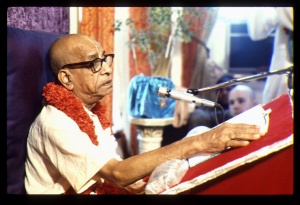SB 3.14.46: Difference between revisions
m (1 revision(s)) |
(Vanibot #0054 edit - transform synonyms into clickable links, which search similar occurrences) |
||
| (One intermediate revision by one other user not shown) | |||
| Line 1: | Line 1: | ||
{{info | {{info | ||
|speaker= | |speaker=Kaśyapa Muni | ||
|listener=Diti, wife of | |listener=Diti, wife of Kaśyapa Muni | ||
}} | }} | ||
[[Category:Srimad-Bhagavatam - Canto 03 Chapter 14]] | |||
[[Category:Bhagavatam Verses Spoken by Kasyapa Muni - Vanisource|031446]] | |||
<div style="float:left">'''[[Srimad-Bhagavatam]] - [[SB 3|Third Canto]] - [[SB 3.14: Pregnancy of Diti in the Evening|Chapter 14: Pregnancy of Diti in the Evening]]'''</div> | |||
<div style="float:right">[[File:Go-previous.png|link=SB 3.14.44-45]] '''[[SB 3.14.44-45]] - [[SB 3.14.47]]''' [[File:Go-next.png|link=SB 3.14.47]]</div> | |||
{{RandomImage}} | |||
==== TEXT 46 ==== | ==== TEXT 46 ==== | ||
<div | <div class="verse"> | ||
yogair hemeva durvarṇaṁ | :yogair hemeva durvarṇaṁ | ||
bhāvayiṣyanti sādhavaḥ | :bhāvayiṣyanti sādhavaḥ | ||
nirvairādibhir ātmānaṁ | :nirvairādibhir ātmānaṁ | ||
yac-chīlam anuvartitum | :yac-chīlam anuvartitum | ||
</div> | </div> | ||
| Line 16: | Line 22: | ||
==== SYNONYMS ==== | ==== SYNONYMS ==== | ||
<div | <div class="synonyms"> | ||
''[//vanipedia.org/wiki/Special:VaniSearch?s=yogaiḥ&tab=syno_o&ds=1 yogaiḥ]'' — by the rectifying processes; ''[//vanipedia.org/wiki/Special:VaniSearch?s=hema&tab=syno_o&ds=1 hema]'' — gold; ''[//vanipedia.org/wiki/Special:VaniSearch?s=iva&tab=syno_o&ds=1 iva]'' — like; ''[//vanipedia.org/wiki/Special:VaniSearch?s=durvarṇam&tab=syno_o&ds=1 durvarṇam]'' — inferior quality; ''[//vanipedia.org/wiki/Special:VaniSearch?s=bhāvayiṣyanti&tab=syno_o&ds=1 bhāvayiṣyanti]'' — will purify; ''[//vanipedia.org/wiki/Special:VaniSearch?s=sādhavaḥ&tab=syno_o&ds=1 sādhavaḥ]'' — saintly persons; ''[//vanipedia.org/wiki/Special:VaniSearch?s=nirvaira&tab=syno_o&ds=1 nirvaira]-[//vanipedia.org/wiki/Special:VaniSearch?s=ādibhiḥ&tab=syno_o&ds=1 ādibhiḥ]'' — by practice of freedom from animosity, etc.; ''[//vanipedia.org/wiki/Special:VaniSearch?s=ātmānam&tab=syno_o&ds=1 ātmānam]'' — the self; ''[//vanipedia.org/wiki/Special:VaniSearch?s=yat&tab=syno_o&ds=1 yat]'' — whose; ''[//vanipedia.org/wiki/Special:VaniSearch?s=śīlam&tab=syno_o&ds=1 śīlam]'' — character; ''[//vanipedia.org/wiki/Special:VaniSearch?s=anuvartitum&tab=syno_o&ds=1 anuvartitum]'' — to follow in the footsteps. | |||
</div> | </div> | ||
| Line 23: | Line 29: | ||
==== TRANSLATION ==== | ==== TRANSLATION ==== | ||
<div | <div class="translation"> | ||
In order to follow in his footsteps, saintly persons will try to emulate his character by practicing freedom from animosity, just as the purifying processes rectify gold of inferior quality. | In order to follow in his footsteps, saintly persons will try to emulate his character by practicing freedom from animosity, just as the purifying processes rectify gold of inferior quality. | ||
</div> | </div> | ||
| Line 30: | Line 36: | ||
==== PURPORT ==== | ==== PURPORT ==== | ||
<div | <div class="purport"> | ||
Yoga practice, the process of purifying one's existential identity, is based mainly on self-control. Without self-control one cannot practice freedom from animosity. In the conditional state, every living being is envious of another living being, but in the liberated state there is an absence of animosity. Prahlāda Mahārāja was tortured by his father in so many ways, yet after the death of his father he prayed for his father's liberation by the Supreme Personality of Godhead. He did not ask any benediction that he might have asked, but he prayed that his atheistic father might be liberated. He never cursed any of the persons who engaged in torturing him at the instigation of his father. | Yoga practice, the process of purifying one's existential identity, is based mainly on self-control. Without self-control one cannot practice freedom from animosity. In the conditional state, every living being is envious of another living being, but in the liberated state there is an absence of animosity. Prahlāda Mahārāja was tortured by his father in so many ways, yet after the death of his father he prayed for his father's liberation by the Supreme Personality of Godhead. He did not ask any benediction that he might have asked, but he prayed that his atheistic father might be liberated. He never cursed any of the persons who engaged in torturing him at the instigation of his father. | ||
</div> | </div> | ||
__NOTOC__ | |||
<div style="float:right; clear:both;">[[File:Go-previous.png|link=SB 3.14.44-45]] '''[[SB 3.14.44-45]] - [[SB 3.14.47]]''' [[File:Go-next.png|link=SB 3.14.47]]</div> | |||
__NOTOC__ | |||
__NOEDITSECTION__ | |||
Latest revision as of 21:31, 17 February 2024

A.C. Bhaktivedanta Swami Prabhupada
TEXT 46
- yogair hemeva durvarṇaṁ
- bhāvayiṣyanti sādhavaḥ
- nirvairādibhir ātmānaṁ
- yac-chīlam anuvartitum
SYNONYMS
yogaiḥ — by the rectifying processes; hema — gold; iva — like; durvarṇam — inferior quality; bhāvayiṣyanti — will purify; sādhavaḥ — saintly persons; nirvaira-ādibhiḥ — by practice of freedom from animosity, etc.; ātmānam — the self; yat — whose; śīlam — character; anuvartitum — to follow in the footsteps.
TRANSLATION
In order to follow in his footsteps, saintly persons will try to emulate his character by practicing freedom from animosity, just as the purifying processes rectify gold of inferior quality.
PURPORT
Yoga practice, the process of purifying one's existential identity, is based mainly on self-control. Without self-control one cannot practice freedom from animosity. In the conditional state, every living being is envious of another living being, but in the liberated state there is an absence of animosity. Prahlāda Mahārāja was tortured by his father in so many ways, yet after the death of his father he prayed for his father's liberation by the Supreme Personality of Godhead. He did not ask any benediction that he might have asked, but he prayed that his atheistic father might be liberated. He never cursed any of the persons who engaged in torturing him at the instigation of his father.